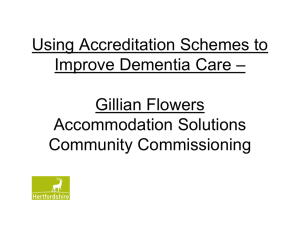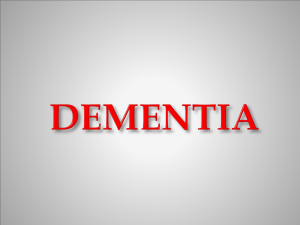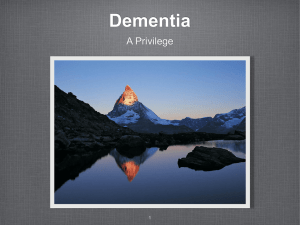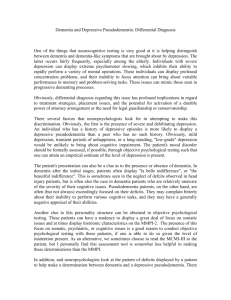The Effects of Music Therapy on Dementia
advertisement
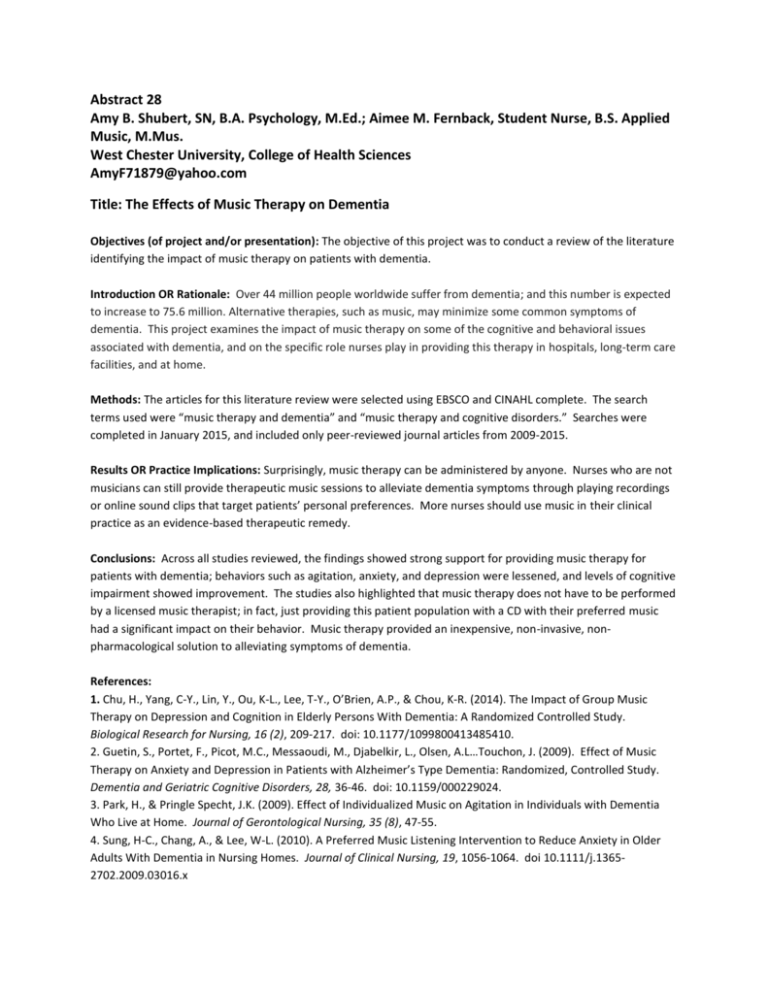
Abstract 28 Amy B. Shubert, SN, B.A. Psychology, M.Ed.; Aimee M. Fernback, Student Nurse, B.S. Applied Music, M.Mus. West Chester University, College of Health Sciences AmyF71879@yahoo.com Title: The Effects of Music Therapy on Dementia Objectives (of project and/or presentation): The objective of this project was to conduct a review of the literature identifying the impact of music therapy on patients with dementia. Introduction OR Rationale: Over 44 million people worldwide suffer from dementia; and this number is expected to increase to 75.6 million. Alternative therapies, such as music, may minimize some common symptoms of dementia. This project examines the impact of music therapy on some of the cognitive and behavioral issues associated with dementia, and on the specific role nurses play in providing this therapy in hospitals, long-term care facilities, and at home. Methods: The articles for this literature review were selected using EBSCO and CINAHL complete. The search terms used were “music therapy and dementia” and “music therapy and cognitive disorders.” Searches were completed in January 2015, and included only peer-reviewed journal articles from 2009-2015. Results OR Practice Implications: Surprisingly, music therapy can be administered by anyone. Nurses who are not musicians can still provide therapeutic music sessions to alleviate dementia symptoms through playing recordings or online sound clips that target patients’ personal preferences. More nurses should use music in their clinical practice as an evidence-based therapeutic remedy. Conclusions: Across all studies reviewed, the findings showed strong support for providing music therapy for patients with dementia; behaviors such as agitation, anxiety, and depression were lessened, and levels of cognitive impairment showed improvement. The studies also highlighted that music therapy does not have to be performed by a licensed music therapist; in fact, just providing this patient population with a CD with their preferred music had a significant impact on their behavior. Music therapy provided an inexpensive, non-invasive, nonpharmacological solution to alleviating symptoms of dementia. References: 1. Chu, H., Yang, C-Y., Lin, Y., Ou, K-L., Lee, T-Y., O’Brien, A.P., & Chou, K-R. (2014). The Impact of Group Music Therapy on Depression and Cognition in Elderly Persons With Dementia: A Randomized Controlled Study. Biological Research for Nursing, 16 (2), 209-217. doi: 10.1177/1099800413485410. 2. Guetin, S., Portet, F., Picot, M.C., Messaoudi, M., Djabelkir, L., Olsen, A.L…Touchon, J. (2009). Effect of Music Therapy on Anxiety and Depression in Patients with Alzheimer’s Type Dementia: Randomized, Controlled Study. Dementia and Geriatric Cognitive Disorders, 28, 36-46. doi: 10.1159/000229024. 3. Park, H., & Pringle Specht, J.K. (2009). Effect of Individualized Music on Agitation in Individuals with Dementia Who Live at Home. Journal of Gerontological Nursing, 35 (8), 47-55. 4. Sung, H-C., Chang, A., & Lee, W-L. (2010). A Preferred Music Listening Intervention to Reduce Anxiety in Older Adults With Dementia in Nursing Homes. Journal of Clinical Nursing, 19, 1056-1064. doi 10.1111/j.13652702.2009.03016.x Funding Source: None







